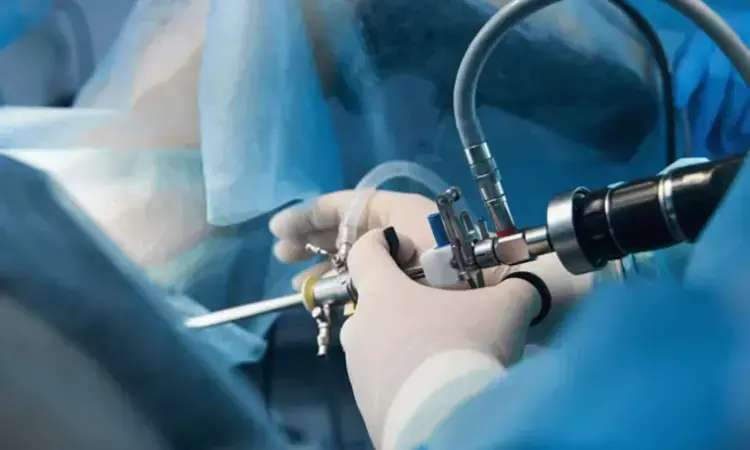- Home
- Medical news & Guidelines
- Anesthesiology
- Cardiology and CTVS
- Critical Care
- Dentistry
- Dermatology
- Diabetes and Endocrinology
- ENT
- Gastroenterology
- Medicine
- Nephrology
- Neurology
- Obstretics-Gynaecology
- Oncology
- Ophthalmology
- Orthopaedics
- Pediatrics-Neonatology
- Psychiatry
- Pulmonology
- Radiology
- Surgery
- Urology
- Laboratory Medicine
- Diet
- Nursing
- Paramedical
- Physiotherapy
- Health news
- Fact Check
- Bone Health Fact Check
- Brain Health Fact Check
- Cancer Related Fact Check
- Child Care Fact Check
- Dental and oral health fact check
- Diabetes and metabolic health fact check
- Diet and Nutrition Fact Check
- Eye and ENT Care Fact Check
- Fitness fact check
- Gut health fact check
- Heart health fact check
- Kidney health fact check
- Medical education fact check
- Men's health fact check
- Respiratory fact check
- Skin and hair care fact check
- Vaccine and Immunization fact check
- Women's health fact check
- AYUSH
- State News
- Andaman and Nicobar Islands
- Andhra Pradesh
- Arunachal Pradesh
- Assam
- Bihar
- Chandigarh
- Chattisgarh
- Dadra and Nagar Haveli
- Daman and Diu
- Delhi
- Goa
- Gujarat
- Haryana
- Himachal Pradesh
- Jammu & Kashmir
- Jharkhand
- Karnataka
- Kerala
- Ladakh
- Lakshadweep
- Madhya Pradesh
- Maharashtra
- Manipur
- Meghalaya
- Mizoram
- Nagaland
- Odisha
- Puducherry
- Punjab
- Rajasthan
- Sikkim
- Tamil Nadu
- Telangana
- Tripura
- Uttar Pradesh
- Uttrakhand
- West Bengal
- Medical Education
- Industry
Misoprostol administration before hysteroscopy may reduce time needed for cervical dilatation in nulliparous women: Study

Hysteroscopy offers superior diagnostic and therapeutic capabilities compared to traditional methods like transvaginal ultrasound and blind dilatation and curettage (D&C). It provides direct visualization of the uterine cavity, enabling targeted biopsies and treatment of various uterine conditions. This procedure is recognized as the preferred method for evaluating uterine health in women of all ages. Recent study conducted by Salah et al. aimed to evaluate the efficacy of administering misoprostol before hysteroscopy in nulliparous women through a systematic review and meta-analysis of randomized controlled trials. Thirteen studies involving 1528 participants were included in the analysis, comparing misoprostol to placebo, dinoglandin, diclofenac, and different doses/routes of misoprostol. The results showed that misoprostol administration improved the time needed for cervical dilatation without increasing complications or side effects compared to placebo. However, misoprostol had similar outcomes to dinoglandin with higher side effects.
Role of Misoprostol in Cervical Preparation
Misoprostol, a synthetic prostaglandin E1 analog, is commonly used in obstetrics and gynecology for various purposes, including cervical preparation before hysteroscopy. The study highlighted that nulliparous and postmenopausal women are more susceptible to pain and complications during hysteroscopy due to their cervical characteristics. The systematic review assessed various outcomes such as ease of dilatation, time needed for dilatation, preoperative cervical width, pain scores, and side effects.
Comparative Analysis of Misoprostol
The analysis revealed that misoprostol significantly reduced the time needed for cervical dilatation but did not show significant differences in preoperative cervical width, failure of dilatation, or preoperative pain compared to placebo. When compared to dinoglandin, misoprostol had similar outcomes in terms of dilatation time and cervical width but led to more preoperative pain and bleeding. The review emphasized the need for further well-organized randomized controlled trials to determine the optimal dose and timing of misoprostol administration before hysteroscopy in high-risk women.
Conclusion and Recommendations
Overall, the study concluded that misoprostol administration before hysteroscopy in nulliparous women can be beneficial in reducing the time needed for cervical dilatation, ultimately improving procedural efficiency and potentially reducing costs. The findings suggest that misoprostol is a valuable option for cervical preparation, but future research with larger sample sizes and standardized protocols is recommended to confirm its efficacy and safety in this specific population.
Key Points
- Evaluating the efficacy of misoprostol before hysteroscopy in nulliparous women through a systematic review and meta-analysis of 13 studies involving 1528 participants.
- Misoprostol administration improved the time needed for cervical dilatation without increasing complications or side effects compared to a placebo, but had similar outcomes to dinoglandin with higher side effects.
- Misoprostol, a synthetic prostaglandin E1 analog, is commonly used in obstetrics and gynecology for cervical preparation before hysteroscopy, especially for nulliparous and postmenopausal women who are more susceptible to pain and complications.
- The systematic review assessed outcomes such as ease of dilatation, time needed for dilatation, preoperative cervical width, pain scores, and side effects when comparing misoprostol to placebo, dinoglandin, diclofenac, and different doses/routes of misoprostol.
- Misoprostol significantly reduced the time needed for cervical dilatation compared to placebo, but did not show significant differences in preoperative cervical width, failure of dilatation, or preoperative pain. However, it led to more preoperative pain and bleeding compared to dinoglandin.
- The study concluded that misoprostol administration before hysteroscopy in nulliparous women can be beneficial in reducing the time needed for cervical dilatation, improving procedural efficiency, and potentially reducing costs. Further well-organized randomized controlled trials are recommended to determine the optimal dose and timing of misoprostol administration in high-risk women.
Reference –
Noha M. Salah et al. (2024). The Use Of Misoprostol Before Hysteroscopy In Nulliparous Women: A Systematic Review And Meta-Analysis Of Randomized Controlled Trials. *BMC Pregnancy And Childbirth*, 24. https://doi.org/10.1186/s12884-024-06993-z.
Dr Kamal Kant Kohli-MBBS, DTCD- a chest specialist with more than 30 years of practice and a flair for writing clinical articles, Dr Kamal Kant Kohli joined Medical Dialogues as a Chief Editor of Medical News. Besides writing articles, as an editor, he proofreads and verifies all the medical content published on Medical Dialogues including those coming from journals, studies,medical conferences,guidelines etc. Email: drkohli@medicaldialogues.in. Contact no. 011-43720751


